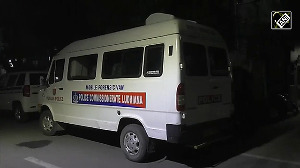"Talks have failed. All negotiations have been suspended," Commerce Minister Kamal Nath told PTI over phone.
"It could take anywhere from months to years," Kamal Nath said on the possibility of resumption of talks.
"We cannot accept opening of our markets for subsidised agriculture products," Nath said. He said the onus was on developed countries to break the deadlock and blamed the US for refusing to make substantial cuts in farm subsidies.
However, US officials blamed other trading partners for the failure to bridge differences on another contentious issue of import duties on agricultural tariffs.
On non-agriculture market access, Nath said India cannot reduce duties on manufactured products without adequate safeguards.
The United States remains committed to a robust, ambitious and balanced round; unfortunately our trading partners were more interested in the loopholes than in market access, US Trade Representative Susan Schwab said.
Besides India, the meeting was attended by ministers from Australia, Brazil, European Union, Japan and the US attended the meeting called by WTO chief Pascal Lamy.
Trade negotiations are stuck on the two most contentious issues of farm subsidies and industrial tariffs due to adamant stance adopted by six key trading nations. The failure of this meeting has jeopardised the future of Doha Round of world trade talks.
The WTO talks may get a leg-up only after about six months when US Congressional elections get over, top government officials said.
"Probably there could be a review of negotiations after six months when the US Congressional elections are over, although it is a extremely difficult situation. If talks do not revive, they could get stalled up to 2009," senior commerce ministry officials told PTI.
Reacting to the failure of WTO's latest attempt to break the deadlock among key trading nations, they said a breakthrough could not be achieved because of compulsions of the US, which would witness these elections by the end of January or beginning of February.
The situation is difficult because US President's fast track authority to get trade pacts passed in the US Congress expires in mid-2007. The US President would have to update the US Congressional Committee on the progress of trade talks by January-end and 60 days notice had to be given to the Committee for taking up the issue.
Unless the US Congress extends the Fast Track Authority, it seems extremely unlikely that a global trade deal that does not suits the world's largest trading nation would be sealed.
Though the European Union had made some movement forward in the area of market access, the U.S did not agree on the farm subsidies issue, the officials said.
The G-20 and G-33 countries represent 90 per cent of the world's farmers though they have only 2 per cent of their population in farming and account for over 50 per cent of the world's share in trade in agriculture.






 © 2025
© 2025